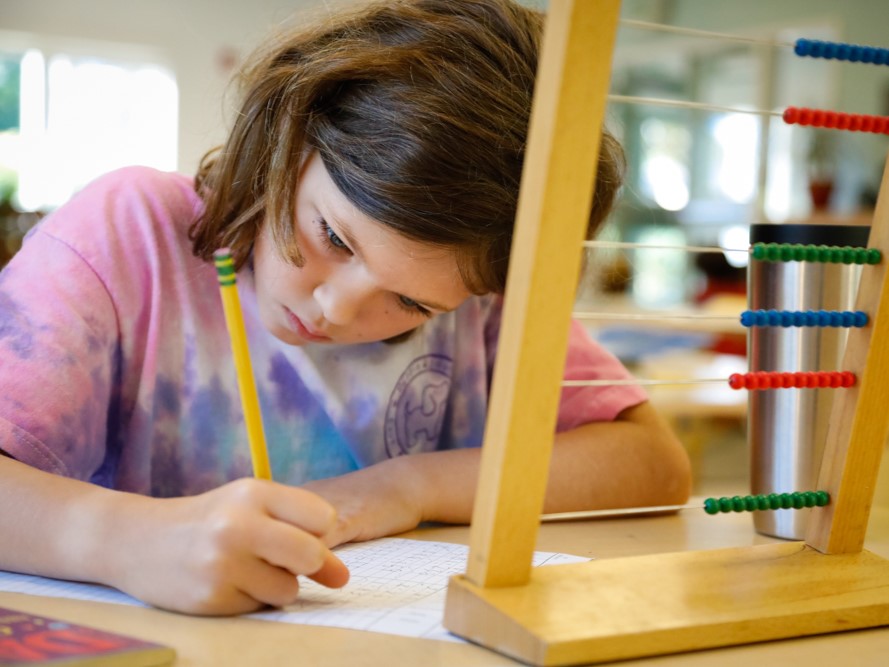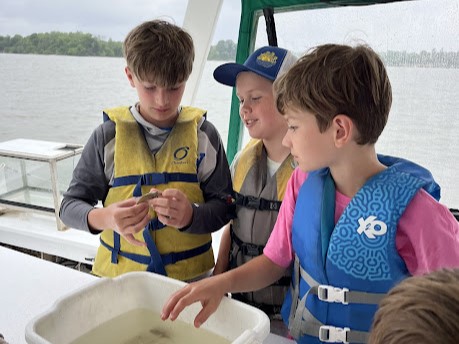

Location: Main Campus
Enrollment/Class: 24-30 students
Ages served: 6 years – 12 years
Staff/Class: 1 AMI-trained faculty and 1 assistant
Daily Schedule:
8:15-8:30 AM – Arrival window
8:15-11:15 AM – Morning Work Period
11:30-12:00 PM – Lunch
Noon-12:45 PM – Physical Education or Recess
1:00-3:00 PM – Afternoon Work Period
3:15-3:30 PM – Dismissal window
Elementary Staff:
Egret Classroom Teacher – Amanda Hughes
Egret Classroom Assistant – Maggie Looney
Bald Eagle Classroom Teacher – Jenny Wyrick
Bald Eagle Classroom Assistant – Maggie Crawford-Adkins
The Elementary Community
The Montessori elementary program, for children between the ages of 6 and 12, is designed to meet the needs of your child in this phase of development. This experience will shape not only his knowledge and skills, but also his attitude about learning for the rest of his life. If we give the world to the primary child, we give the universe to the elementary child.
Students at this age explore reasons and causes and use their powers of abstraction to learn about things which they cannot perceive directly. They work collaboratively with other children on projects and expand their environment far beyond the classroom, recognizing the resources of the community and their place within it. As they develop abstract thinking and use their imagination, they are able to explore everything from the origin of the earth to the reaches of outer space. The goal of the elementary curriculum is to capture the children’s attention and help understand their world, how it functions, and how it directly affects them and they affect the world. A teacher and an assistant work with an average class size of 25 to 30 students.
Introductory lessons, called keys, present subjects in ways that stimulate the children’s desire to learn more. The lessons use concrete or illustrative aids at first; then show children how to work in the abstract. Many unique Montessori materials and activities are used to help the child.
The three period lesson is the model used to foster learning: the first period entails new knowledge being introduced by the teacher, the second period allows the student the time and activity to explore and discover concepts (really, it is the time period in which learning happens), and the third period is when a student’s knowledge is tested and demonstrated as having been mastered.
Inspired by great lessons, children work independently or in small groups, practicing the ideas and skills, or conducting their own research. There are few textbooks or workbooks like those found in the typical classroom. Instead, a child may choose from a variety of books on each subject based on goals and interests. Children practice reading and writing daily, but they do not just learn basic skills; they learn to apply those skills in ways that expand their knowledge. In the process, children develop the lifelong gifts of a reasoning mind and a joy of learning.
CMS elementary classes provide opportunities for student exploration and research which can lead the child to greater depths than in a customary classroom. Much of the work is generated by the child’s own interest; therefore, a child’s knowledge is more likely to become a part of him or her. Children are helped to integrate varied parts of the curriculum to better understand relationships between physical, biological, and cultural phenomena.
The Montessori program for the elementary student is strong and well-rounded, incorporating exploration and analysis. Major subject areas are mathematics, geometry, geography, English, science, history, art, and music. The students become so involved with their projects that they do them not because they have to, but because they have inquiring natures and questioning minds. They are looking for reasoning and understanding, not simple answers. Students learn not just facts and figures but learn how to learn so that they become lifelong learners.

